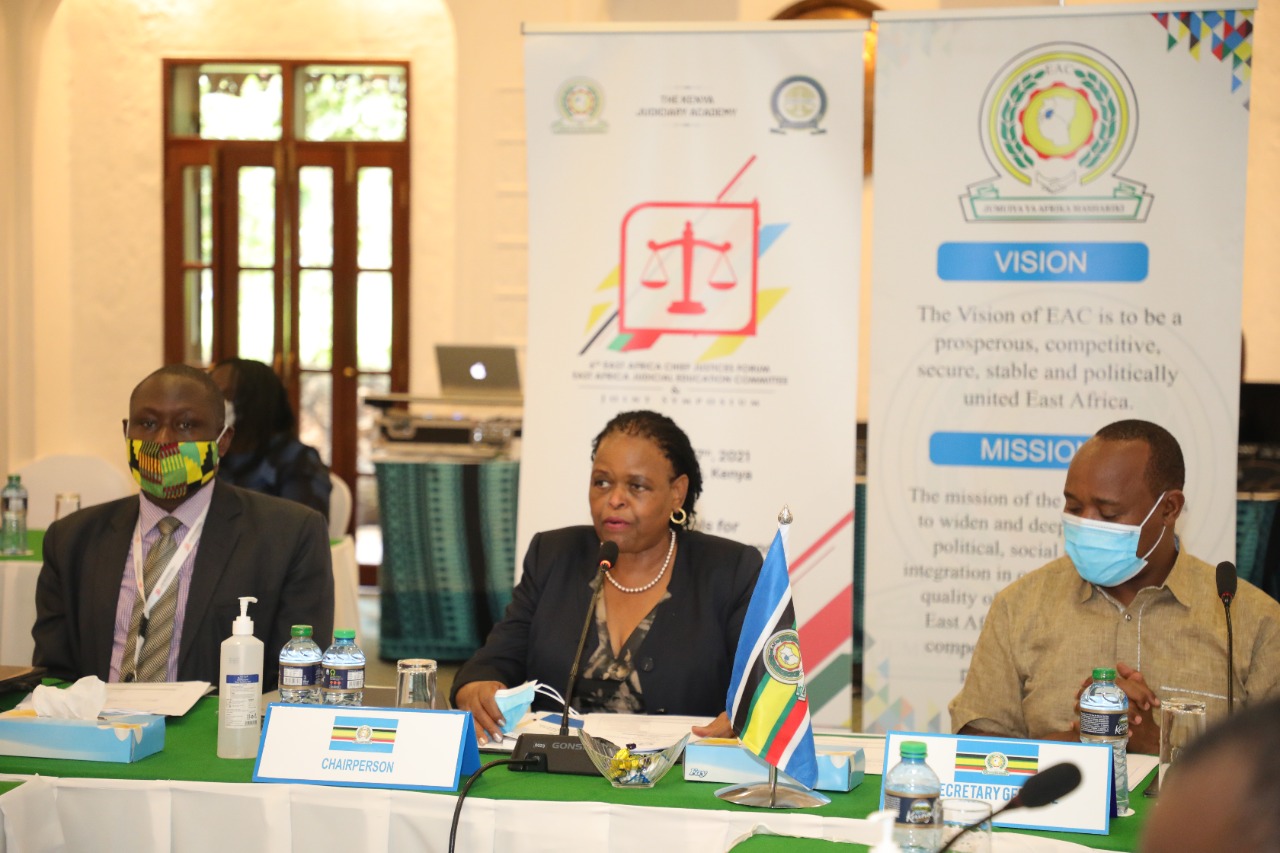
EAC Chief Justices call for increases funding for Judiciaries in the region
East African Community Headquarters, Arusha, Tanzania, 18th December, 2021: The East African Chief Justices Forum (EACJF) has called for increased funding for national judiciaries and the East African Court of Justice (EACJ).
EACJF, which brings together Partner States’ Chief Justices and the Judge President of the East African Court of Justice, said that budgetary allocation to the judiciaries in the region should be substantially enhanced to allow the judiciary to exercise its mandate in a timely and efficient manner.
The Chief Justices said that the judiciary budget should be ring-fenced as a fixed percentage of the national budget, 2.5% of the annual budget.
The 6th EACJC, which was chaired by Kenya’s Chief Justice Martha Koome, further agreed to establish a modern, functional, stable, and sustainable ICT ecosystem for the Judiciaries in all Partner States.
The Chief Justices affirmed that it was essential that courts deepen and expand the use of technology in their operations through investment in infrastructure; recruitment of enough personnel; continuous training of judges, judicial officers and staff; continuous public education; and increased budget allocation to judicial digitization.
It was agreed that the Chief Justices of each country and President of the EACJ shall personally take charge in leading the automation processes within their jurisdictions.
The resolutions are contained in the resolutions of the Joint Symposium of the Forum of EAC Chief Justices and the East African Judicial Education Committee that was held in Mombasa, Kenya from 15th to 16th December, 2021 and that were adopted by the Forum on Friday, 17th December, 2021.
The Chief Justices urged the EAC Secretariat to formalize the institutional standing of the Forum of EAC Chief Justices, which should advise on the implementation of policies and programmes that foster adherence to the rule of law, good governance and share concerns with the Council and the Summit when needed.
The Forum agreed that Chief Justices initiate the Chief Justice-Private Sector Roundtables in their respective Partner States and at the regional level to function as avenues for dialogue that can facilitate an enabling business environment and increase efficiency in resolving commercial disputes.
On regional cooperation in the enforcement of law and order, it was agreed that the respective judiciaries establish modalities to enhance closer regional collaboration in combating of trans-boundary crimes.
On alternative dispute resolution mechanisms, the Chief Justices agreed to support the establishment, financing, and operationalization of the Small Claims Courts, Plea Bargaining, and Arbitration and Mediation as suitable mechanisms for delivering quicker and affordable ways of delivering justice to vulnerable people.
It was agreed that respective Judiciaries strengthen performance evaluation as a way of enhancing individual and institutional accountability.
On the harmonisation of judicial systems in the region, the EACJC agreed to pursue the harmonisation of legal training, certification and promoting standardisation of judgments in the judiciaries of the Partner States.
Speaking at the Forum, EAC Secretary General Hon. (Dr.) Peter Mathuki described the EAC Chief Justices' Forum as a big step in strengthening judicial systems in EAC.
“The EACJF-EACJEC Joint Symposium's Resolutions were pertinent on how to improve judicial systems capacity to deliver justice to East Africans,” said Dr. Mathuki, adding that efficient delivery of justice was in line with the views of the Summit of EAC Heads of State in taking the Community to the people at the grassroots.
Dr. Mathuki emphasized the need to embrace a cooperative and collaborative approach in terms of how the EAC and National Judiciaries conduct business.
Dr. Mathuki hailed national judiciaries and the EACJ for adopting e-services that have ensured continued delivery of justice to East Africans during the Covid-19 pandemic.
He commended the Judiciary of Kenya for its efforts to establish courts near border posts to resolve cross-border trade disputes and encouraged the other judiciaries to establish the same, adding that such courts would help resolve cross-border disputes and make the integration process seamless.
For more information, please contact:
Simon Peter Owaka
Senior Public Relations Officer
Corporate Communications and Public Affairs Department
EAC Secretariat
Arusha, Tanzania
Tel: +255 768 552087
Email: sowaka [at] eachq.org
About the East African Community Secretariat:
The East African Community (EAC) is a regional intergovernmental organisation of six Partner States, comprising Burundi, Kenya, Rwanda, South Sudan, Tanzania and Uganda, with its headquarters in Arusha, Tanzania.
The EAC Secretariat is ISO 9001: 2015 Certified
